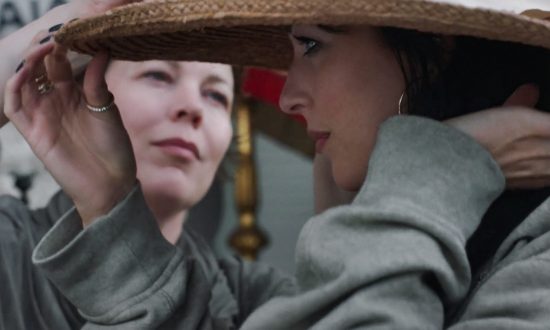LFF 2021 Review: The Lost Daughter – “A thrillingly-weird ride with a resonant message”

THE LOST DAUGHTER (L to R): OLIVIA COLMAN as LEDA, DAKOTA JOHNSON as NINA. CR: YANNIS DRAKOULIDIS/NETFLIX © 2021.
A man held court outside the screening of The Lost Daughter, surrounded by a small group. “I just didn’t get it,” he exclaimed, “I thought Colman would go full psychopath, what a shame,” voice raising, “and why call it the lost daughter? Everyone is found!” Heads nodded all round. He was right about one thing, he just didn’t get it. When making a film, the director learn they can only lead the horses to water, because Maggie Gyllenhaal’s debut is a triumph, telling the interconnected stories of many lost daughters, and this won’t be lost on savvy viewers ready to drink in the experience. Make no mistake, this film is wonderful, strange and amusing, and at times, deeply unsettling. It’s a perfect debut, led by magnificent performances from Olivia Colman and Jessie Buckley. Whether Colman does goes full psychopath is a matter of opinion…
Based on the novella by Elena Ferrante, Colman stars as Leda, a languages professor who takes a solo holiday to a greek island, purportedly to scribble down class plan ideas around her favourite greek texts. Her bliss is disturbed by a large mafioso-like family from Queens including matriarch Callie (Dagmara Dominczyk) and hoodlum Toni (Oliver Jackson-Cohen) carelessly destroying Leda’s seaside peace. Leda bonds with a young mother in the group, Nina (Dakota Johnson) who is struggling with parenting her young child, which sends Leda on a journey through memory of her own (perceived) failings as a parent many years earlier – rendered with grace by Jessie Buckley. This reverie and release of years of suppressed anger makes Leda act out, and she begins to play a dangerous game with Nina’s family.
The tone of The Lost daughter is fascinating. A vein of quiet terror pulses through the film, some of it born from Leda’s self-evisceration as she struggles to marry the desires she has as a person and a woman with the expectations of motherhood, some of it from the pressures of being a single person unwilling to be cowed by neither unruly teenage hijinks nor large families assuming a lone individual will secede to the whims of a group (when Leda tells Callie and her 30-strong family that no, she won’t move her lounger to accommodate them, the tension is palm-sweatingly palpable). Gyllenhaal, aware that she wants to make something more than a thriller, also exploits Colman’s comic timing in Leda’s funny exchanges with hotel manager Lyle (Ed Harris) and cabana boy Will (Paul Mescal). Some of these scenes are bizarre, but Colman has always been a purveyor of surreal comedy and these scenes add to the feeling of disarray watching a woman whose struggles with her choices are threatening to overwhelm her.
With its tragi-comic tone, The Lost Daughter feels like a personal work from Gyllenhaal (who has two children) about the often competing struggles of motherhood and a professional career, and it’s exhilarating to see these female choices on screen in a palatable form. Gyllenhaal hints at more going on beneath the surface, and instead makes the wise choice to put female pleasure on screen, and to interrogate the stranglehold of cultural norms about parenting. This movie is so accomplished at showing the banalities of childcare that it’s practically a new form of contraception. Cinematographer Helene Louvart (Portrait of a Lady on Fire) spends a lot of time close on Colman’s face as she runs through a gamut of emotions, which works well for a film about the interior fighting with the exterior. Gyllenhaal also packs in numerous subplots and subtexts, about acting with entitlement, doing the right thing in the face of personal danger, and of the thrill of acting on a whim.
The Lost Daughter is a thrilling-weird ride with a resonant message. It’s essential viewing, with ideas that will prick the subconscious long after the credits roll.









